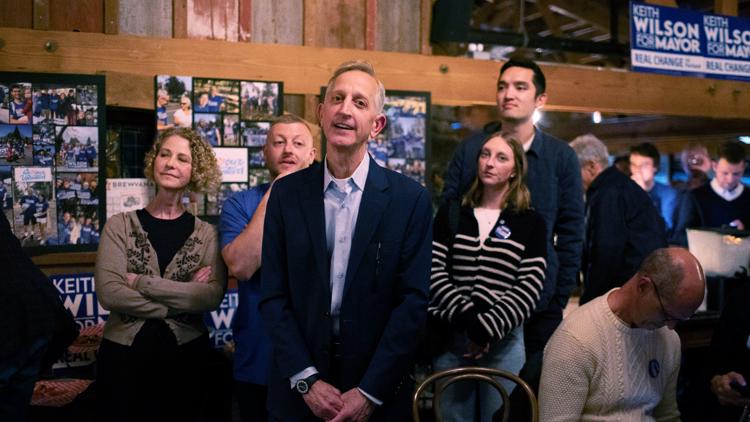
PORTLAND, Ore. — Trucking CEO and political outsider Keith Wilson is set to become Portland's next mayor after taking a demanding lead in the city's first-ranked choice election. Wilson was initially seen as a longshot candidate, but he emerged as a consensus choice on election night and through the next day.
When the Oregonian called the election in his favor, he held 62% of the vote after the race narrowed down to him and current City Commissioner Carmen Rubio, who held 38%. In the campaign, Wilson pledged to end unsheltered homelessness in his first year on the job, and said he believes Portland is ready for big change. Here are five things to know about Wilson as he gets ready to take office as the next Portland mayor.
1. Goal to end unsheltered homelessness Wilson's campaign for mayor centered on ending unsheltered homelessness in Portland, which he claimed he'd do within one year if elected. Much of Wilson's plan follows the blueprint of the nonprofit he founded called Shelter Portland , which focuses on creating a system of nighttime walk-in emergency shelters and daytime shelters with services.
In an interview with KGW, Wilson proposed that Portland needs at least one emergency shelter bed at night for every person who needs it. "So, if there’s 4,000 souls in Portland, we’re going to need 4,000 beds almost overnight," Wilson said. "Now, it doesn’t necessarily mean everybody is going to come from outside in, but by doing so, we immediately get to enforce our codes, which are there is no camping, no makeshift shelters.
" To do this, Wilson said he's going to "promote a public safety emergency" in the first days of taking office, where he will use city assets and ask other private public-facing partners, like churches, to open their doors at night to become a nighttime walk-in emergency shelter. Wilson's stance on public safety has also been rooted in the ability to open up more shelter beds. During the KGW mayoral debate , he put forward that unsheltered homelessness plays an outsized role in tying up existing resources.
He said that half of arrests were of unsheltered people, claiming that ending unsheltered homelessness would thus reduce the workload for police. 2. Camping bans In the months leading up to Election Day, Wilson tended to be more vague on his stance toward camping bans.
But in an interview with KGW in April , Wilson talked about a plan to give a 90-day notice before clearing all encampments in Portland. "So, the first 90 days, once we announce that we’re ending unsheltered homelessness," he said, "we’ll give everybody a 90-day notice and start reunifying them, but at that 91st day, we will remove all the encampments, because it's illegal. It's against our codes.
But we will have a shelter for everybody." Portland's current camping ban that began in July allows the city to fine or jail homeless people if there are shelter beds available and they refuse to take the offer. A key part of the plan depends on the city having sufficient shelter for everyone living on the street — which it does not.
So, as of right now, the camping ban tends to only be enforced in specific circumstances and more so when dealing with a "problematic campsite." In the KGW mayoral debate, Wilson supported the threat of jail time, if shelter was made available and offered first. 3.
Tents and tarps distribution Wilson is against handing out tents and tarps to people living on the streets , a practice that Multnomah County was found doing but since paused after scrutiny . "I will, as mayor, make sure the city is not and the county shouldn’t," Wilson said in a KGW interview . "Why would we do that?" A report found that the city-and-county run Joint Office of Homeless Services (JOHS) gave out more than 6,500 tents and more than 24,000 tarps in the last year.
Proponents, including Multnomah County Chair Jessica Vega Pederson, argue that it helps people survive and gives relief until there is enough treatment and shelter available, though the amount distributed and cost has been questioned. Records show the city pays Rapid Response Bio Clean — a commercial cleaning company — more than $26 million for a four-year contract to remove homeless camps. In the last year, 8,000 to 12,000 tents were removed, arguably many of the same tents Multnomah County paid for.
Wilson said that if people "want to live on a sidewalk, exposed to the elements, that’s their right. But by code, they should not be in a tent." 4.
Reduce carbon emissions Wilson is the CEO and president of Portland-based Titan Freight Systems , the state's first fossil-free trucking company. So it comes as no surprise that Wilson plans to be a climate leader when mayor. His campaign's climate pledges centered on converting Portland's vehicle fleet to electric power, investing in a high-speed railway linking Portland, Seattle and Vancouver, British Columbia, and implementing greener strategies to repair roads and reduce congestion, according to Wilson's campaign website.
In an episode of Straight Talk , Wilson said he hopes to make Portland into a city with the lowest carbon footprint in the nation. 5. Background Wilson grew up in North Portland, attended Oregon State University and got his master's degree in business administration from the University of Portland.
Prior to that, he attended Portsmouth Middle School, Roosevelt High School and Portland Community College. He is the son of a truck driver and went on to be second-generation at Titan Freight Systems, where he has transformed the company into one of the most climate-friendly trucking companies in the U.S.
Wilson said he was chief petitioner for House Bill 3590 , passed in 2023, which directs Oregon State University's College of Forestry to research how wood waste from logging can be turned into low-carbon fuels. Being Portland's mayor will be Wilson's first elected office. KGW's Blair Best and Jamie Parfitt contributed reporting to this article.
.














